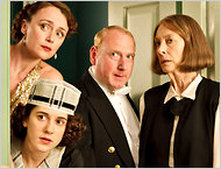TELEVISION REVIEW
Like Old Times, Almost, in an English Household
By ALESSANDRA STANLEY, April 7, 2011

There is a sly grace note tucked into “Upstairs Downstairs,” the sequel to the legendary series of the 1970s. The parlor maid Rose Buck (Jean Marsh) is back in service at 165 Eaton Place, and she worries that her new mistress considers her over the hill.
In a rare breach of the British class divide, her ladyship's mother-in-law, Lady Maud, an imperious and eccentric dowager played by Eileen Atkins, makes common cause with the help.
“She doubtless thought you were ready to be put out to grass,” Lady Maud tells Rose with grande dame finality. “I daresay she thinks the same of me But we have experience you and I. We are what that house requires.”
The two actresses might as well have been talking about themselves in real life. They are no longer young, but they have experience, and they are exactly what this delightful and absorbing drama requires.
Ms. Marsh not only played Rose in the original, she and Ms. Atkins came up with the idea for a high-minded soap opera about Edwardian aristocrats and their servants at a time when not many women, let alone actresses, had much say behind the television camera.
While Ms. Atkins wasn’t in the first iteration, which ran on PBS from 1974 to 1977 and was one of the most successful series in its history, here she takes up her rightful place as a meddling intruder, sweeping into her son’s elegant town house unannounced after 30 years overseas, accompanied by an Indian manservant and a pet monkey.
“Why didn’t you stand up to her?” Lady Agnes (Keeley Hawes) asks her young husband, Sir Hallam Holland (Ed Stoppard). He ruefully replies, “I was brought up to be polite to strangers.”
The three-part sequel that begins on Sunday picks up in 1936, six years after the end of “Upstairs, Downstairs” (as it was then punctuated) and right into the territory of “The King’s Speech.” Rose, now running a small employment agency, weeps and dons a black armband along with the rest of England at the news that King George V has died. That leaves the throne to Edward VIII, who wants to marry an American divorcée, Wallis Simpson. Simpson, whom Lady Maud sourly describes as “relentlessly well dressed,” makes an appearance at Eaton Place, as do all sorts of people who changed history, including Anthony Eden, Joachim von Ribbentrop and even the fashion photographer Cecil Beaton.
The sequel manages to blend the domestic trials of an upper-class family into the turbulence of the 1930s much the way the original took the Bellamy family from 1903 though the sinking of the Titanic, World War I and the Jazz Age.
This version actually looks better. “Upstairs, Downstairs” was one of the first series to be mostly shot on videotape, which now looks a little flat and faded. But the sequel also holds its own against the many period series and movies that followed, from “Brideshead Revisited” to “Remains of the Day” to “Gosford Park” to “Atonement,” variations that added a scrim of dark satire to all those shimmering depictions of privilege and breeding. Deceit and self-delusion — in master and servant alike — became as much a staple of those tableaus as silver tea sets, croquet lawns and debutante balls.
“Downton Abbey,” a series on PBS last January that was at heart a country-estate version of “Upstairs, Downstairs,” was much less cynical.
Social injustice and class friction aren’t ignored, but there are once again heroes as well as villains, upstairs and down, and Lord Hallam is a kind, well-meaning master, very much in the same vein as the gentlemen who preceded him in Eaton Place. Characters are capable of change, and some actually learn from their mistakes.
Beautiful Lady Agnes has limitations to overcome, and Lord Hallam’s overbearing mother shows occasional glimpses of wisdom and even warmth. Even Rose, once she takes over as housekeeper, has a few snappish moments.
The rigid English class system is still in place, but it is fraying at the edges, as Rose witnesses firsthand when she tries to find a cook. “Staff were loyal once upon a time,” Rose tells a surly candidate, Mrs. Thackeray (Anne Reid).
“Yeah, it’s a one-way street,” Mrs. Thackeray replies, grousing that Rose probably didn’t even get a pension. “We’ll end up dead in harness, like the king.”
The screenwriter Heidi Thomas (“Cranford”), who wrote the new episodes, wisely didn’t try to duplicate beloved characters, but instead created new ones molded by the times. Mr. Pritchard (Adrian Scarborough), the butler Rose reluctantly hires, is not nearly as polished as the imperturbable Hudson (played by Gordon Jackson in the original). Rose questions his previous experience on cruise ships.
“I’ve worked for Cunard for 27 years,” Mr. Pritchard haughtily replies. “Hence my reference from Errol Flynn.”
Like the real-life Mitford sisters, the Holland family splits along ideological lines when Agnes’s younger and petulant sister, Persie (Claire Foy), becomes infatuated with the handsome chauffeur Spargo (Neil Jackson), a follower of the British fascist Oswald Mosley.
Even the chauffeur, however, knows his place — and hers. When Persie impertinently climbs into the front seat next to him and demands that he call her “Lady Persie,” Spargo orders her to the back.
“I won’t call you Lady anything if you don’t act like one,” he says sternly. “The thing is, Lady Persie, there are rules and you have to stick to them just as much as us.”
“Upstairs Downstairs” sticks to the rules established by the original and defies the odds by being as good, and in some ways, even better.
